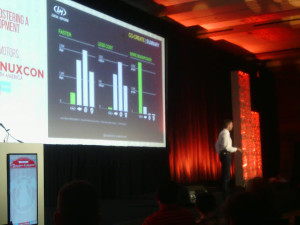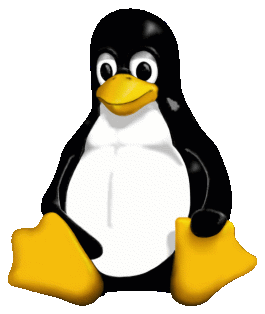Wednesday was the first day of LinuxCon and CloudOpen North America 2014 in Chicago. The event began with a keynote speech from Jim Zemlin on the State of Linux where he touched on a wide range of new developments and issues in the Linux Industry. He opened his keynote by stating “Linux Represents one of the greatest shared technology investments in the history of computing.” A testament to the adoption of Linux in nearly every single modern industry.
He attributes the widespread success of Linux to the accelerating growth of mass collaboration as open source increasingly becomes a profession for many. As a result, we have seen the proliferation of open source foundations that fuel the adoption and support of open source technologies. Software is eating the world, and it seems open source is eating software.
The Pareto Prinicple
Gartner’s prediction of 80% of the software world being dominated by open source has come to fruition as we have witnessed a dramatic shift in many industries from open source being a minority to the greater majority of software in use. In the past, standards have been the primary method for multiple companies to come to agreement on the use of technology. While that is still often the case, open source appears to be replacing standards as the primary form of collaborative development.
The Importance of Foundations
Zemlin stressed the importance of foundations in the adoption of open source. Foundations serve as a neutral home for resources and intellectual property to be shared openly, an environment that enables structured investments from large corporations. Additionally, foundations help industry understand the role of open source technologies through education, demonstrating the value of open source technology, and developing relationships between industry and community. Open source foundations also share IP management resources and help in legal defense of open source. Finally, foundations provide a neutral home for key developers, help address market failures, and bring developers together under a common cause.
Linux Certifications
Zemlin closed his keynote with the announcement of two new training certifications for Linux systems administration and engineering. These certifications are remotely proctored, allowing anyone, anywhere to get the Linux certification of their choice. They focus on performance-based metrics, and are designed to be distribution flexible and stay current.
Kernel Panel Discusses their Ongoing Efforts
Following Zemlin’s keynote, the Linux Kernel panel discussed a wide range of issues including the tinification of the kernel for embedded devices, how to get more people involved in kernel development, ongoing kernel maintenance issues, and important security problems. When asked what he would like to see next, Linus Torvalds responded “I would still like to get a Linux Desktop” sparking a round of applause and laughter from the audience.
A Diverse Evening of Open Source
The evening keynote sessions featured three dynamic speakers who discussed open source in a variety of industries outside the world of Linux. The first was Anant Agarwal, the CEO of EdX who discussed the huge changes occurring to education as a result of his company’s open source Massive Open Onlince Course (MOOC) platform. EdX is founded on three tenets: expanding access to education, improving traditional education, and helping advance educational research. A feature of his keynote was the introduction to Linux course which has had over 200,000 students register since its launch last March. The EdX platform is being replicated all over the web for a diverse range of applications. He closed by briefly discussing a blended learning program that was piloted at San Jose University for an introduction to electronics course that is required for all engineering students. In the first semester failure rates dropped from 41% to 9%, a statistic that remained consistent through 4 semesters of testing.
 A Revolution in Manufacturing
A Revolution in Manufacturing
Jay Rogers, the CEO of Local Motors, gave a riveting speech on the revolutionary manufacturing process his company is leading in the automotive industry. His work has led to a car manufacturing process in which he claims designs and builds cars five times faster than conventional manufacturing with 100 times less capital investment. The company does this through a unique process that involves crowd-funding and community design.
The New Open Source Professional
Eileen Evans, VP and General Counsel of cloud computing and open source wrapped up the day with a discussion on the emergence of a new open source professional. She described how open source communities have evolved from the voluntary developer culture of the early 80’s to a tech industry in which more than 50% of businesses are adopting open source as a part of the operations. She claimed open source is a business imperative, a statement she backed up with the statistic that the number one reason developers get involved in open source is because their job required it. She described a type of professional whose career path is non-linear and whose expertise spans many areas of technology including technical, business, and legal roles. Additionally, these open source professionals tend to be open-minded, collaborative, and consensus-driven.
Open Source is Everywhere
The first day of LinuxCon showed attendees how open source is appearing everywhere, often in new and entirely unique ways. The individuals that acquire open source skills are likely to succeed in a business environment that is increasingly demanding them. It seems the open source movement is only gaining momentum and is not likely to slow down anytime soon.




